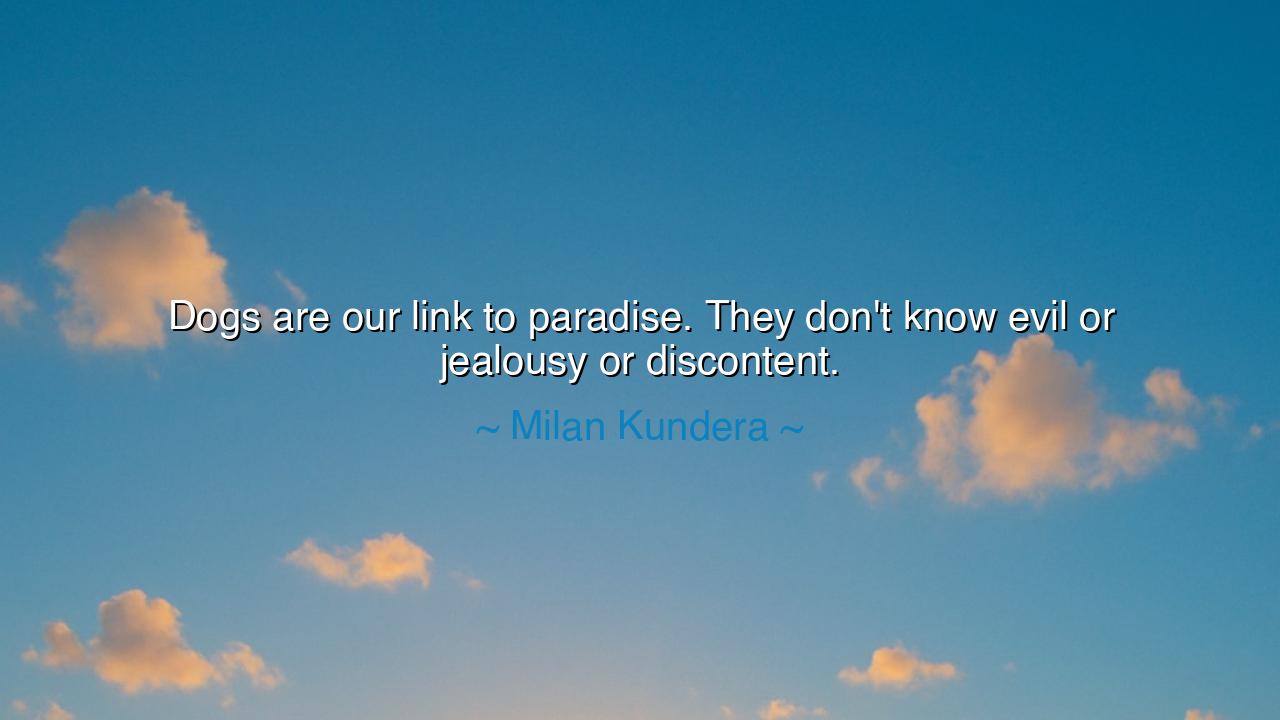
Dogs are our link to paradise. They don't know evil or jealousy






In the tender and luminous words of Milan Kundera, the philosopher and novelist who explored the beauty and fragility of the human soul, there shines a truth that pierces the heart: “Dogs are our link to paradise. They don’t know evil or jealousy or discontent.” These words are not merely praise for an animal — they are a revelation of what humanity has lost and what innocence still endures within the loyal eyes of a dog. For in these creatures, Kundera saw a reflection of something sacred — a reminder of a world before corruption, before pride, before the hunger for more. He saw, in their pure love and contentment, the echo of paradise — that mythical state of being where joy was simple, love was unconditional, and peace was natural to the soul.
The origin of this thought can be found in Kundera’s own life and philosophy, particularly in his novel The Unbearable Lightness of Being. Living through the turmoil of exile, political oppression, and existential despair, he sought to understand what it means to live rightly in a world steeped in suffering. Amidst his reflections on love, identity, and mortality, he turned his gaze toward animals — especially dogs — as beings untouched by the moral labyrinth of man. To Kundera, the dog represented purity without self-consciousness, a creature incapable of evil, jealousy, or discontent because it has never been separated from its nature. Unlike man, who is forever divided between desire and guilt, dogs live in the eternal present — loving without judgment, loyal without condition, alive without anxiety.
To call dogs our “link to paradise” is to say that through them, we glimpse what we once were — and what we might yet be. In their presence, the weight of civilization, ambition, and doubt falls away. The dog does not ask for wealth, power, or glory; it asks only for companionship. It does not envy, for its heart knows no measure of comparison. It does not scheme, for it has no hunger for control. It loves because it exists — and in loving, it fulfills its purpose. Thus, the dog lives closer to the divine than we do, for it still remembers what we have forgotten: that joy is not found in possession, but in being.
Consider the story of Hachiko, the faithful dog of Japan, who waited for his master every evening at the train station — even years after the man’s death. For nearly a decade, Hachiko returned to the same place, in sun and snow, never understanding that his beloved friend would not return. To the eyes of man, his waiting may seem tragic; but to the soul, it is holy. His loyalty was not reasoned, but pure; not chosen, but lived. In that steadfast devotion lies the reflection of paradise itself — a love without bitterness, a faith without question, a constancy untouched by time. Hachiko’s story, though rooted in this world, speaks of another — the paradise of which Kundera wrote, where love is perfect and sorrow does not taint the heart.
Kundera’s insight also reveals, by contrast, the fallen nature of humanity. We, who once shared the same earth and innocence as animals, have become creatures of restlessness. We know discontent because we are never satisfied; we know jealousy because we measure ourselves against others; we know evil because we seek power beyond love. In our pursuit of progress, we have lost the simplicity of existence. We look at dogs and feel both affection and envy — for in their gaze we see peace, and in their lives we see freedom from the endless striving that consumes us. They remind us that paradise was never lost — it is only forgotten.
And yet, Kundera does not offer despair. His words invite reflection and renewal. If dogs are our link to paradise, then perhaps, by loving them and learning from them, we can find our way back to something pure within ourselves. They teach us to be present, to forgive quickly, to love fully, and to rest in the quiet dignity of being alive. In their trust, we see how love can exist without fear. In their joy, we see that contentment does not require abundance. In their loyalty, we glimpse the sacred thread that binds all living things.
The lesson, then, is both gentle and profound: learn from those who do not speak, for they live truths that words have forgotten. Be like the dog — faithful, patient, and joyful in simplicity. When envy stirs, remember the dog’s peace. When bitterness rises, remember its forgiveness. When life feels heavy, look into its eyes and see what the world could be if we loved without condition. For in every wag of the tail, in every silent vigil beside its master, the dog reminds us of Eden — not as a place we have lost, but as a way of being we can still reclaim.
So, my listener, heed Milan Kundera’s sacred truth: “Dogs are our link to paradise.” They are not merely companions but guides — quiet messengers of grace walking among us. Through them, the divine whispers softly: “Be kind. Be loyal. Be content.” And perhaps, if we listen, if we learn, we may find that paradise is not a distant memory, but something still alive — in every act of love, in every moment of peace, and in every faithful heart that beats beside our own.






AAdministratorAdministrator
Welcome, honored guests. Please leave a comment, we will respond soon